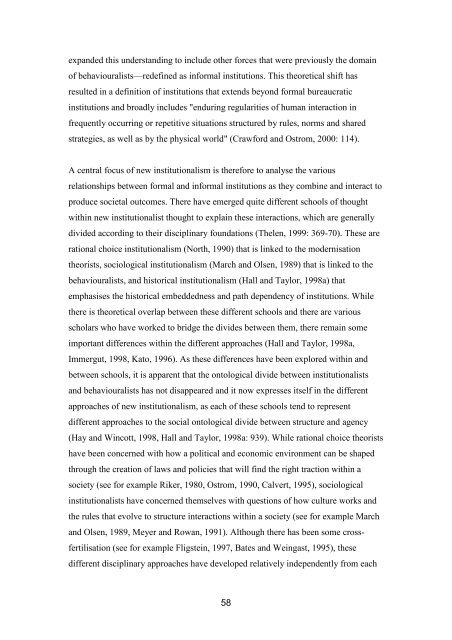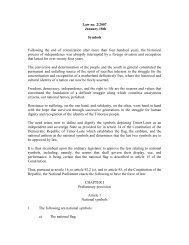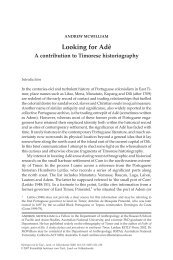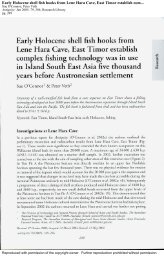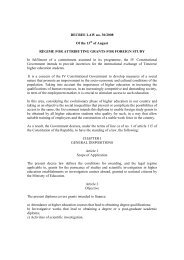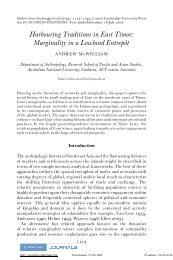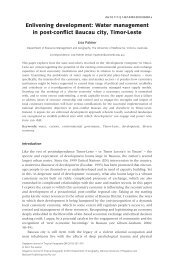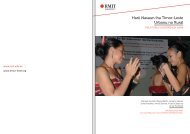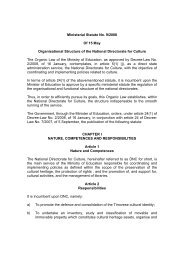Local Governance in Timor-Leste - Secretaria de Estado da Arte e ...
Local Governance in Timor-Leste - Secretaria de Estado da Arte e ...
Local Governance in Timor-Leste - Secretaria de Estado da Arte e ...
- No tags were found...
Create successful ePaper yourself
Turn your PDF publications into a flip-book with our unique Google optimized e-Paper software.
expan<strong>de</strong>d this un<strong>de</strong>rstand<strong>in</strong>g to <strong>in</strong>clu<strong>de</strong> other forces that were previously the doma<strong>in</strong>of behaviouralists—re<strong>de</strong>f<strong>in</strong>ed as <strong>in</strong>formal <strong>in</strong>stitutions. This theoretical shift hasresulted <strong>in</strong> a <strong>de</strong>f<strong>in</strong>ition of <strong>in</strong>stitutions that extends beyond formal bureaucratic<strong>in</strong>stitutions and broadly <strong>in</strong>clu<strong>de</strong>s "endur<strong>in</strong>g regularities of human <strong>in</strong>teraction <strong>in</strong>frequently occurr<strong>in</strong>g or repetitive situations structured by rules, norms and sharedstrategies, as well as by the physical world" (Crawford and Ostrom, 2000: 114).A central focus of new <strong>in</strong>stitutionalism is therefore to analyse the variousrelationships between formal and <strong>in</strong>formal <strong>in</strong>stitutions as they comb<strong>in</strong>e and <strong>in</strong>teract toproduce societal outcomes. There have emerged quite different schools of thoughtwith<strong>in</strong> new <strong>in</strong>stitutionalist thought to expla<strong>in</strong> these <strong>in</strong>teractions, which are generallydivi<strong>de</strong>d accord<strong>in</strong>g to their discipl<strong>in</strong>ary foun<strong>da</strong>tions (Thelen, 1999: 369-70). These arerational choice <strong>in</strong>stitutionalism (North, 1990) that is l<strong>in</strong>ked to the mo<strong>de</strong>rnisationtheorists, sociological <strong>in</strong>stitutionalism (March and Olsen, 1989) that is l<strong>in</strong>ked to thebehaviouralists, and historical <strong>in</strong>stitutionalism (Hall and Taylor, 1998a) thatemphasises the historical embed<strong>de</strong>dness and path <strong>de</strong>pen<strong>de</strong>ncy of <strong>in</strong>stitutions. Whilethere is theoretical overlap between these different schools and there are variousscholars who have worked to bridge the divi<strong>de</strong>s between them, there rema<strong>in</strong> someimportant differences with<strong>in</strong> the different approaches (Hall and Taylor, 1998a,Immergut, 1998, Kato, 1996). As these differences have been explored with<strong>in</strong> andbetween schools, it is apparent that the ontological divi<strong>de</strong> between <strong>in</strong>stitutionalistsand behaviouralists has not disappeared and it now expresses itself <strong>in</strong> the differentapproaches of new <strong>in</strong>stitutionalism, as each of these schools tend to representdifferent approaches to the social ontological divi<strong>de</strong> between structure and agency(Hay and W<strong>in</strong>cott, 1998, Hall and Taylor, 1998a: 939). While rational choice theoristshave been concerned with how a political and economic environment can be shapedthrough the creation of laws and policies that will f<strong>in</strong>d the right traction with<strong>in</strong> asociety (see for example Riker, 1980, Ostrom, 1990, Calvert, 1995), sociological<strong>in</strong>stitutionalists have concerned themselves with questions of how culture works andthe rules that evolve to structure <strong>in</strong>teractions with<strong>in</strong> a society (see for example Marchand Olsen, 1989, Meyer and Rowan, 1991). Although there has been some crossfertilisation(see for example Fligste<strong>in</strong>, 1997, Bates and We<strong>in</strong>gast, 1995), thesedifferent discipl<strong>in</strong>ary approaches have <strong>de</strong>veloped relatively <strong>in</strong><strong>de</strong>pen<strong>de</strong>ntly from each58


